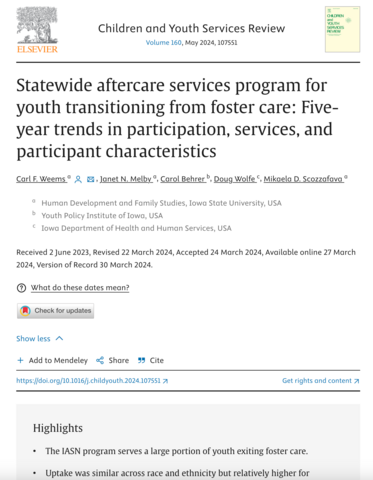Research shows that youth who leave foster care to live independently are often at risk of homelessness, less education, unemployment/poverty, and mental health issues. There are a number of reasons for this increased risk. A variety of aftercare services for youth leaving foster care are designed to help address these risks.
The purpose of this study was to examine trends in participation and understand the experiences of youth transitioning from foster care who were involved in the Iowa Aftercare Services Program. The authors examine trends in participation, services received, participant reports of service satisfaction, as well as employment and educational data at entry and exit over the past five years. They also examine trends in adverse life experiences and mental health characteristics. This is a secondary analysis of Iowa Aftercare Services program evaluation data, which includes survey data on participant reports of service satisfaction, as well as employment and educational data at entry and exit.
The results suggest that the program serves a large portion of youth exiting foster care and is associated with high rates of satisfaction with the services, as well as high self-sufficiency ratings in housing, finances, and relationships. Moreover, youth rates of employment and education were greater when exiting the program than at study entry. They found variation in the rates of services received across the types of supports and found high rates of mental health and adverse life experiences among the participants. The findings from this study adds to the literature, suggesting the benefit of statewide aftercare services and opportunities for enhancing programs for foster care youth. Specifically, mental health services might be augmented for this population with specific assessment targets, opportunities to facilitate recruitment of males, and the need to identify and reduce potential barriers to youth accessing available services.

